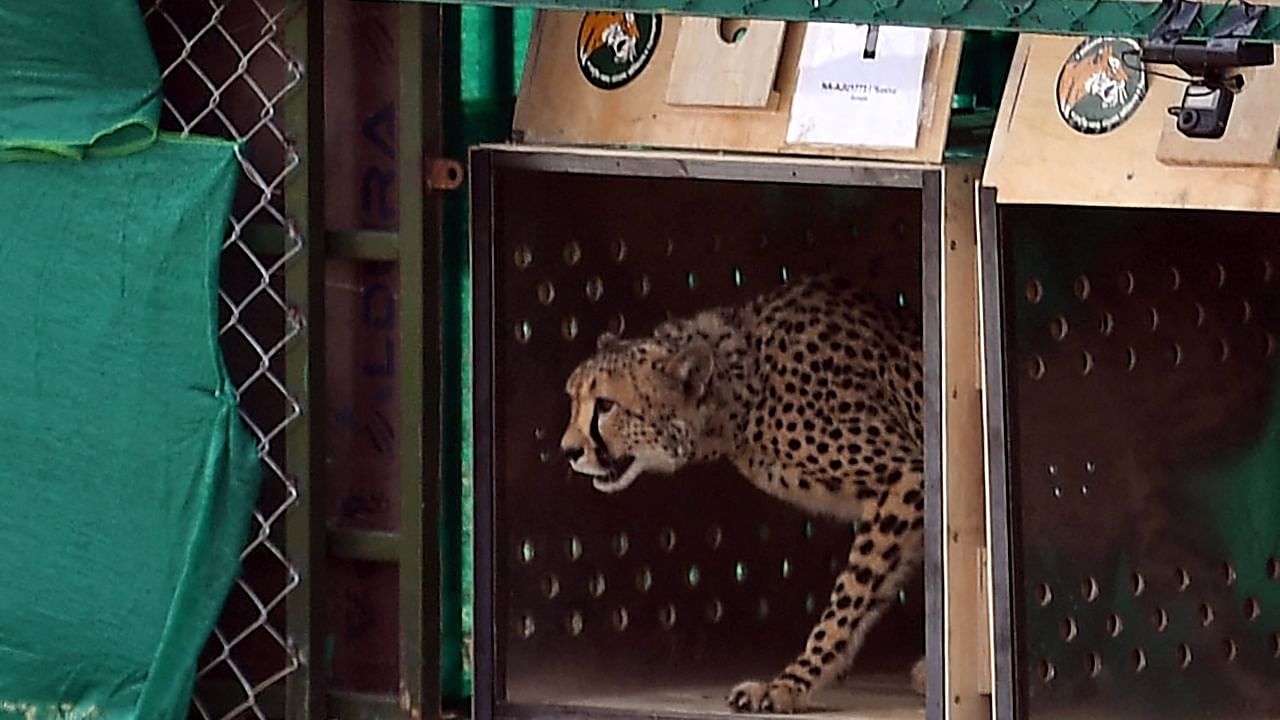
A photo of a wild cheetah being released at Kuno National Park in Madhya Pradesh.
Credit: PTI Photo
New Delhi: A report by the Accountant General of Madhya Pradesh has flagged concerns over the management of Project Cheetah in Kuno National Park, highlighting a "lack of coordination" between central and state government departments.
The report also revealed that despite the arrival of cheetahs from Africa, the park's management plan for 2020-2030 has no mention of cheetah reintroduction.
When asked about these concerns, the chief conservator of forests and director of the Lion Project, Uttam Sharma, said they had provided responses to the auditors but declined to share specific details.
"It's a routine exercise which is conducted in several phases. Any action, if required, will be taken after the completion of the entire process," he said. The audit, covering the period from August 2019 to November 2023, found that ground staff and the Kuno Wildlife Division were not involved in either "site selection" or "cheetah reintroduction study".
The report, obtained under the Right to Information Act, said the Kuno Sanctuary was originally identified as a second habitat for Asiatic lions. "However, no effort has been made for the reintroduction of Asiatic lions till November 2023," it said.
S P Yadav, the director general of the International Big Cat Alliance, told PTI last week that natural geographic isolation is occurring among Asiatic lion populations in Gujarat and there is currently no need to translocate them.
The audit report said, "There was no mention of cheetahs in this management plan... Therefore, the expenditure of Rs 44.14 crore incurred on Project Cheetah from 2021-22 to 2023-24 (till January 2024) was not in accordance with the approved management plan." According to the report, the auditors could not find any records clarifying "under whose instructions the cheetah reintroduction work began".
In accordance with the Supreme Court's directions dated January 28, 2020, a three-member committee was formed to select the most suitable location for African cheetahs. This panel was required to submit its report to the apex court every four months.
"The Supreme Court had only established the expert committee. It was unclear whether the cheetah reintroduction would be carried out solely within the Kuno National Park.
"Therefore, there is no chapter on cheetah reintroduction in the management plan. The work related to cheetah reintroduction is being carried out according to the Cheetah Action Plan 2021, prepared by the central government," the Forest Division told the auditors.
It added that Kuno was to be developed as an alternative habitat for Asiatic lions, as per the Supreme Court's decision dated April 15, 2013, and the state government was "completely serious" about it.
The audit report said: "It is evident from the statements of the Forest Division that there was a lack of coordination between the departments of the Government of India and the Government of Madhya Pradesh."
"It is also clear that the ground staff and the Forest Division were not involved in the site selection or the cheetah reintroduction study. The matter has been brought to the attention of the government," it said.
The report adds that 43 out of 255 sanctioned posts were vacant, "which can have an immediate impact on the protection of forests and wild animals".
The report noted that Prakash Kumar Verma, the former Divisional Forest Officer (DFO) of the Kuno Wildlife Division, was sent to South Africa and Namibia for training in cheetah management.
However, he was transferred elsewhere just a few days after the training, rendering his "training unusable for cheetah reintroduction, and the expenditure on it futile".
According to the Action Plan for the Introduction of Cheetah in India, trained staff were not to be removed from cheetah conservation sites for a "minimum period of five years".
Bhopal-based wildlife activist Ajay Dubey said the report raises several important questions, including concerns about the "coordination and understanding between central and state government departments", which are crucial for the success of the cheetah reintroduction programme.
It is important to note that, despite the arrival of African cheetahs in Kuno as part of the world's first-ever such effort, many key positions remain vacant, directly impacting the management of the animals.
As part of the first-ever intercontinental translocation of the big cats, 20 cheetahs have been brought to Kuno National Park in Madhya Pradesh so far -- eight from Namibia in September 2022 and 12 from South Africa in February 2023.
Since their arrival in India, eight adult cheetahs -- three females and five males -- have died.
Seventeen cubs have been born in India, with 12 surviving, bringing the total number of cheetahs, including cubs, in Kuno to 24. Currently, all are in enclosures. The grand initiative completes two years on September 17.
The 'Action Plan for Reintroduction of Cheetah in India' outlines bringing around 12-14 cheetahs each year from South Africa, Namibia, and other African countries for five years to establish a founder stock.